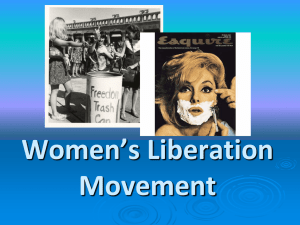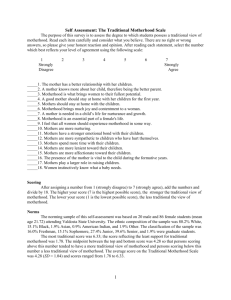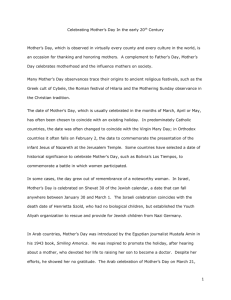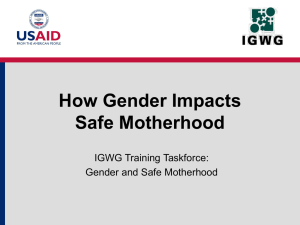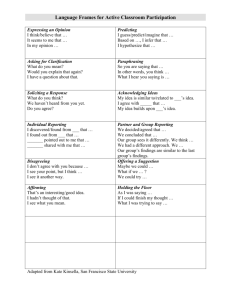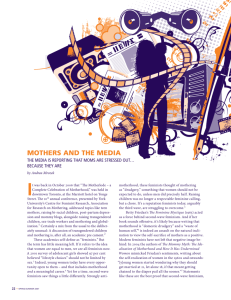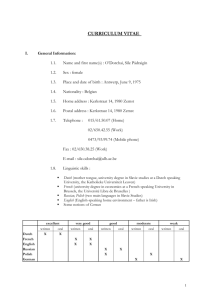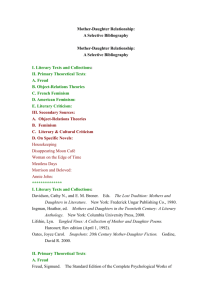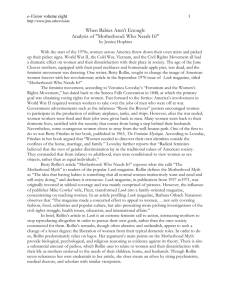BETTY FRIEDAN - The TAI Group
advertisement
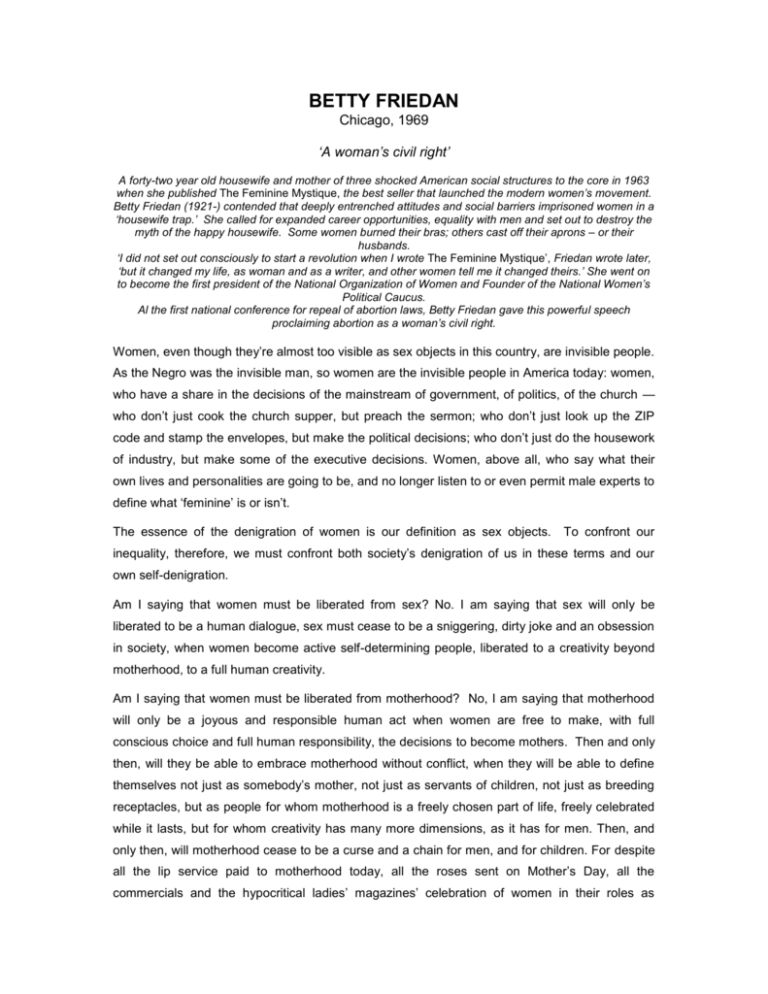
BETTY FRIEDAN Chicago, 1969 ‘A woman’s civil right’ A forty-two year old housewife and mother of three shocked American social structures to the core in 1963 when she published The Feminine Mystique, the best seller that launched the modern women’s movement. Betty Friedan (1921-) contended that deeply entrenched attitudes and social barriers imprisoned women in a ‘housewife trap.’ She called for expanded career opportunities, equality with men and set out to destroy the myth of the happy housewife. Some women burned their bras; others cast off their aprons – or their husbands. ‘I did not set out consciously to start a revolution when I wrote The Feminine Mystique’, Friedan wrote later, ‘but it changed my life, as woman and as a writer, and other women tell me it changed theirs.’ She went on to become the first president of the National Organization of Women and Founder of the National Women’s Political Caucus. Al the first national conference for repeal of abortion laws, Betty Friedan gave this powerful speech proclaiming abortion as a woman’s civil right. Women, even though they’re almost too visible as sex objects in this country, are invisible people. As the Negro was the invisible man, so women are the invisible people in America today: women, who have a share in the decisions of the mainstream of government, of politics, of the church — who don’t just cook the church supper, but preach the sermon; who don’t just look up the ZIP code and stamp the envelopes, but make the political decisions; who don’t just do the housework of industry, but make some of the executive decisions. Women, above all, who say what their own lives and personalities are going to be, and no longer listen to or even permit male experts to define what ‘feminine’ is or isn’t. The essence of the denigration of women is our definition as sex objects. To confront our inequality, therefore, we must confront both society’s denigration of us in these terms and our own self-denigration. Am I saying that women must be liberated from sex? No. I am saying that sex will only be liberated to be a human dialogue, sex must cease to be a sniggering, dirty joke and an obsession in society, when women become active self-determining people, liberated to a creativity beyond motherhood, to a full human creativity. Am I saying that women must be liberated from motherhood? No, I am saying that motherhood will only be a joyous and responsible human act when women are free to make, with full conscious choice and full human responsibility, the decisions to become mothers. Then and only then, will they be able to embrace motherhood without conflict, when they will be able to define themselves not just as somebody’s mother, not just as servants of children, not just as breeding receptacles, but as people for whom motherhood is a freely chosen part of life, freely celebrated while it lasts, but for whom creativity has many more dimensions, as it has for men. Then, and only then, will motherhood cease to be a curse and a chain for men, and for children. For despite all the lip service paid to motherhood today, all the roses sent on Mother’s Day, all the commercials and the hypocritical ladies’ magazines’ celebration of women in their roles as housewives and mothers, the fact is that all television or night-club comics have to do is go before a microphone and say the words ‘my wife,’ and the whole audience erupts into gales of guilty, vicious and obscene laughter. The hostility between the sexes has never been worse. The image of women in avant-garde plays, novels and movies, and behind the family situation comedies on television is that mothers are man-devouring, cannibalistic monsters, or else Lolita’s, sex objects — and objects not even of heterosexual impulse, but of sadomasochism That impute — the punishment of women — is much more of a factor in the abortion question than anybody ever admits. Motherhood is a bane almost by definition, or at least as long as women are forced to be mothers — and only mothers – against their will. Like a cancer cell living its life through another cell, women today are forced to live too much through their children and husbands (they are too dependent on them, and therefore forced to rake too much varied resentment, vindictiveness, inexpressible resentment and rage out on their husbands and children). Perhaps it is the least understood fact of American politics: the enormous buried violence of women in this country today. Like all oppressed people, women have been taking their violence out on their own bodies, in all the maladies with which they plague MDs and the psychoanalysts. Inadvertently, and in subtle insidious ways, they have been taking their violence out, too their children and on their husbands, and sometimes they’re not subtle. The battered-child syndrome that we are hearing more and in about from our hospitals is almost always to be found in the instance of unwanted children, and women are doing the battering, as much or more than men, in the case histories of psychologically and physically maimed children, the woman is always the villain, and the reason is our definition of her: not only as passive sex object, but mother, servant, someone else’s mother, someone else’s wife. Am I saying that women have to be liberated from men? That men are the enemy? No. I am saying the men will only truly be liberated to love women and to be fully themselves when women are liberated to have a full say in the decisions of their lives and their society. Until that happens, men are going to bear the guilty burden of the passive destiny they have forced upon women, the suppressed resentment, the sterility of love when it is not between two fully active, joyous people, but has in it the element of exploitation. And men will not be free to be all they cart be as long as they must live up to an image of masculinity that disallows all the tenderness and sensitivity in a man, all that might be considered feminine. Men have enormous capacities in them that they have to suppress and fear in order to live up to the obsolete, brutal, beat-killing, Ernest Hemingway, crew-cut Prussian, napalm-all-the-children-in-Vietnam, bangbang-you’re-dead image of masculinity. Men are not allowed to admit that they sometimes are afraid. They are not allowed to express their own sensitivity, their own need to be passive sometimes and not always active. Men are not allowed to cry. So they are only half-human, as women are only half-human, until we can go this next step forward. All the burdens and responsibilities that men are supposed to shoulder alone makes them, I think, resent women’s pedestal, much as that pedestal maybe a burden for women. This is the real sexual revolution. Not the cheap headlines in the papers about at what age boys and girls go to bed with each other and whether they do it with or without the benefit of marriage. That’s the least of it. The real sexual revolution is the emergence of women from passivity, from the point where they are the easiest victims for all the seductions, the waste, the worshiping of false gods in our affluent society, to full self-determination and full dignity. And it is the emergence of men from the stage where they are inadvertent brutes and masters to sensitive, complete humanity. This revolution cannot happen without radical changes in the family as we know it today; in our concepts of marriage and love, in our architecture, out cities, our theology, our politics, out art. Not that women arc special. Not that women are superior. But these expressions of human creativity are bound to be infinitely more various and enriching when women and men are allowed to relate to each other beyond the strict confines of the Ladies’ Home Journal’s definition of the Mamma and Papa marriage. If we are finally allowed to become full people, not only will children be born and brought up with more love and responsibility than today, but we will break out of the confines of that sterile little suburban family to relate to each other in terms of all of the possible dimensions of our personalities — male and female, as comrades, as colleagues, as friends, as lovers. And without so much hate and jealousy and buried resentment and hypocrisies, there will be a whole new sense of love that will make what we call love on Valentine’s Day look very pallid. It’s crucial, therefore, that we see this question of abortion as more than a quantitative move, more than a politically expedient move. Abortion repeal is not a question of political expedience. It is part of something greater. It is historic that we are addressing ourselves this weekend to perhaps the first national conference of women and men. Women’s voices are finally being heard saying it the way it is about the question of abortion both in its basic sense of morality and in its new political sense as part unfinished revolution of sexual equality. In this confrontation, we are making an important milestone this marvelous revolution that began long before any of us were born and which still has a long way to go. As the pioneers, Mary Wollstonecraft to Margaret Sanger gave us the consciousness that brought us from our several directions here, so we here, in changing the very terms of the debate on abortion to assert women’s, right to choose, and to define the terms of out lives ourselves, women further to full human dignity. Today, we moved it forward.
